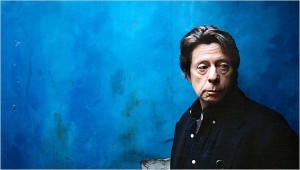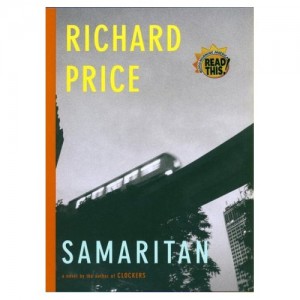by Clayton Moore, this article originally appeared on Bookslut
So I’ll live a lush life in some small dive
And there I’ll be
While I rot with the rest of those
Whose lives are lonely too. – Billy Strayhorn, “Lush Life”
For some reason, I end up having to go stalk perfectly well-behaved writers just days before the holiday blackout. Last year, I ended up catching Walter Mosley home sick with a cold a couple of days before Christmas and the man was a joy to interview, as was Elmore Leonard and Donald Westlake on the same day, no less.
This year, it was my solemn duty to go interrogate the guy who composed this immortal cinematic introduction, delivered on screen by no less than Martin Scorsese.
Nine Ball is rotation pool, the balls are pocketed in numbered order. The only ball that means anything, that wins it, is the nine. Now the player can shoot eight trick shots in a row, blow the nine, and lose. On the other hand, the player can get the nine in on the break, if the balls spread right, and win. Which is to say that, luck plays a part in nine ball. But for some players, luck itself is an art.
Beautiful, right? That’s the smoky voice-over that launches the 1986 film The Color of Money. Sure, it’s loosely based on the novel by the equally cool Walter Tevis but its screenplay was composed from scratch by street-level bard Richard Price. Of course, Price had already made his literary bones with The Wanderers (1974) and Blood Brothers (1976), tapping into a hard-knock upbringing in the projects of the Bronx to relate his memories of the place.
As if that weren’t enough to lionize the guy, he’s also responsible for the eighties cop classic Sea of Love, the underrated De Niro vehicle Mad Dog and Glory, and most recently can be found amongst familiar brethren like Dennis Lehane and George Pelecanos writing episodes for David Simon’s HBO drama The Wire.
Even before landing the gig on The Wire, fans were drawing comparisons between the show and a pair of biting novels written by Price in the 1990s. The author had long been on the literary radar for Clockers, which vividly portrayed a cat-and-mouse game between crack dealers and everybody else in Dempsey, New Jersey. Freedomland, set in the same bleak ghetto landscape, delved even deeper into racial tension and the politics that ravage urban America. Both were turned into acclaimed films with screenplays by the novelist.
Following the cool but admittedly more prosy Samaritan (2002), Price has returned in force by getting out of the boroughs and straight into the heart of New York for Lush Life, a rich, contemplative examination of the Lower East Side and the culture clashes and even more complex racial tensions that exist in neighbourhoods the author likens to an overgrown garden.
Although dozens of well-drawn characters demand our attention, the book zeroes in on Eric Cash, a thirty-something self-professed artistic hyphenate who knows in his heart that he’s really stuck playing maître d’ at a hipster restaurant. But when a couple of street kids pop a couple of bullets in newly hired bartender Isaac Marcus, it’s up to the book’s hard-drinking homicide detective Matty Clark and his partner Yolanda Bello to separate out the truth from Eric’s bullshit. A hell of a fine piece of storytelling ensues.
Fortunately, I finally connect with the writer at his New York headquarters. He’s got a few minutes, as do I, and so we bat around the ideas and locales that sparked the man’s Lush Life.
“The geographic location drove the story and the characters came after it,” Price told me. “Right now, the irony is that it’s revitalization that’s getting everybody’s attention. The real estate has gone through the roof as opposed to what you saw in the early 1990s, when it was probably the most dangerous area of Manhattan in terms of crime, drugs and violence. Giuliani’s law-and-order administration came in and real estate needed a place to go. Nothing defeats crime like real estate. So whenever people read about the Lower East Side now, it’s about this fabulous little restaurant or how many millions this small pied-a-terre is going for. But you still have the Chinese and the housing project life, the black and Hispanic culture, and the Orthodox Jews who are a world unto themselves.”
But while one might think that central conflict between cultures and the subsequent murder that arises from their proximity is the driving event, Price cautions that Lush Life revolves around more than a simple conflict between good guys and bad guys.
“I wanted to portray this eternal high/low disparity that exists here,” he said. “You might think this is disingenuous but I never thought of myself as a mystery writer or a thriller writer or any sort of genre writer. I have a very complicated landscape. But I’ve discovered that if I follow the course of an investigation, it’s a very convenient horse to ride because the natural progression of an investigation will take you into all the worlds you want to touch in a very organized way. I don’t even care who did it. It’s an excuse to get into the world. I would rather say who did it in the first sentence and get it out of the way. There are so many dead ends in this book, so many things that go nowhere. This thing solves itself almost out of spite.”
Price reveals that the actual writing process took about three years but that the issues that inform his novels are simmering in the back of his mind much of the time.
“I don’t consciously sit down to write about race or immigration,” Price said. “The stories that pop up lean towards these things because they’re on my mind. So when I come up with ideas for books, my mind gravitates towards stories that involve issues like race and class and the elements of urban America. There’s a lot of stuff like illegal immigration issues or whether we’re getting better or worse racially or what’s happening to the middle class that I don’t even fully explore or that frankly, I don’t care about in a bald way. But somehow, when something happens, it all gels in a way that for me is very compelling without being lecture-ish or full of conjecture.”
The change in geography begs the question: does getting out of the Bronx and New Jersey and into the proverbial guts of Manhattan represent foreign territory?
“No,” Price said. “Being from an immigrant background like most people in New York City, this is where my family started out, as did the family of everybody I grew up with. We came from eastern European Jews. People fleeing European poverty kind of spilled off the boat into the Lower East Side, whether they were Jewish or Catholic or whatever, and then worked their way up and out from there over the generations. So it’s kind of like the mother land.”
Price also recalled that growing up in the Parkside projects in the Bronx gave him a unique perspective on race relations.
“I didn’t grow up on a farm, you know?” he said. “’Melting pot’ is such a pie in the sky phrase but if your father was making 4,000 bucks in 1950, they put you in the Parkside Projects whether you were black, white, Chinese, or a Holocaust survivor. I wasn’t thinking of anybody as a character, of course. Extreme behaviour could be exotic but the fact that somebody was a particular race was like, ‘So what?’ But you also experience that dividing out. Suddenly you’re nine and you notice that everybody is gravitating to their side of the divide. I experienced growing into a race awareness that you don’t have when you’re little. But some people never had that racial mix or separation to begin with.”
Because Price’s novels utilize some of the same gritty elements as a program like The Wire, it might be reasonable to think that one trade affects the other but Price says that he keeps the two callings separated.
“One doesn’t inform the other, not really,” Price said. “The best screenwriter would make a terrible novelist and would write the most superficial novel. By the same token, the best novelist would make the most tedious screenwriter because you would have no sense of the momentum required by the screen. It’s like squash and racquetball. They’re deceptively similar but you better know which one you’re playing or you’re going to wind up in the hospital.
“The only time it trips me up as a screenwriter is when I start to rely too heavily on dialogue. I like for people to talk but as soon as you watch a movie and it’s great, you realize there are maybe 300 words of dialogue. A movie isn’t about who says what. That’s a play. A screenplay is 120 words of story that you bang you and it’s all two-dimensional. Books are four-dimensional.”
Music has played a role in setting the tone for many of Price’s earlier books, whether it’s the gangster rap that punctuates Clockers or the rhythm-and-blues influences in other books. But for Lush Life, the alternating cacophony and silences of the city seem to rule.
“When I was younger, I used to listen to certain stuff to get in the mood, be it old doo-wop records or sixties rock n’ roll,” Price said. “It’s funny, though. For all the cultures and types of people living here, I didn’t listen to a single note of anything for Lush Life. Either I’m growing up or I have a harder time concentrating.”
That last admission might not be strictly true. The title is cribbed from a classic tune written by Billy Strayhorn in the mid-1930s that’s been covered by a ton of vocalists from Sinatra to Linda Ronstadt. When it comes time to apply the phrase to the Lower East Side, though, Price sticks to his own interpretation.
“I knew it was a Billy Strayhorn tune but I never read the lyrics,” Price said. “I didn’t know it was about a bunch of old drunk ladies. I never realized it was about one of that old third-avenue, Lost Weekend bars. When I finished the book, I downloaded all these old versions of the song and went, ‘Oh, no.’ I just like the phrase because I was trying to write about the variety of cultures here. I don’t want to sound like the United Nations but this place is like, a riot of people. So I was thinking of the word lush like you have loco weed next to American beauties next to crabgrass and Redwood trees. I didn’t realize it meant bombed. So I guess I kind of blew the title.”
The bottom line? It’s a damned good book and a worthy companion to your bookshelf whether you’re looking for complicated crime or simply great literature. Anything else to add, Mr. Price?
“Gee, they used to say if you want to send a message, you go to Western Union,” Price said. “I hope it’s a good read. I love what I wrote about so that’s all I can say.”
‘Lush Life’ is out in the UK this week.

